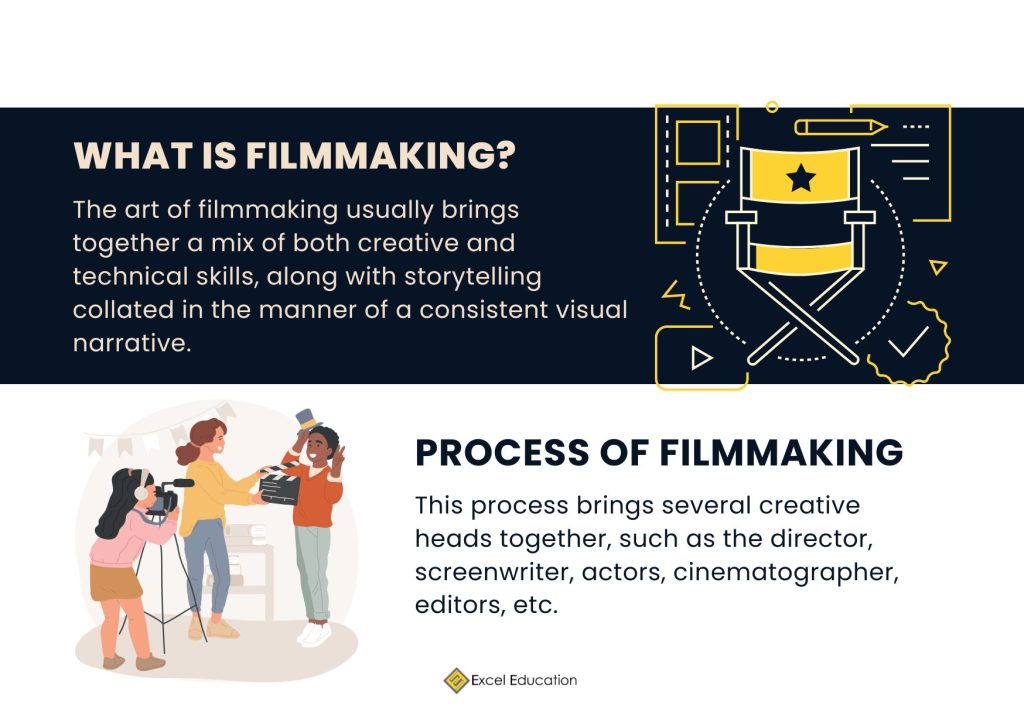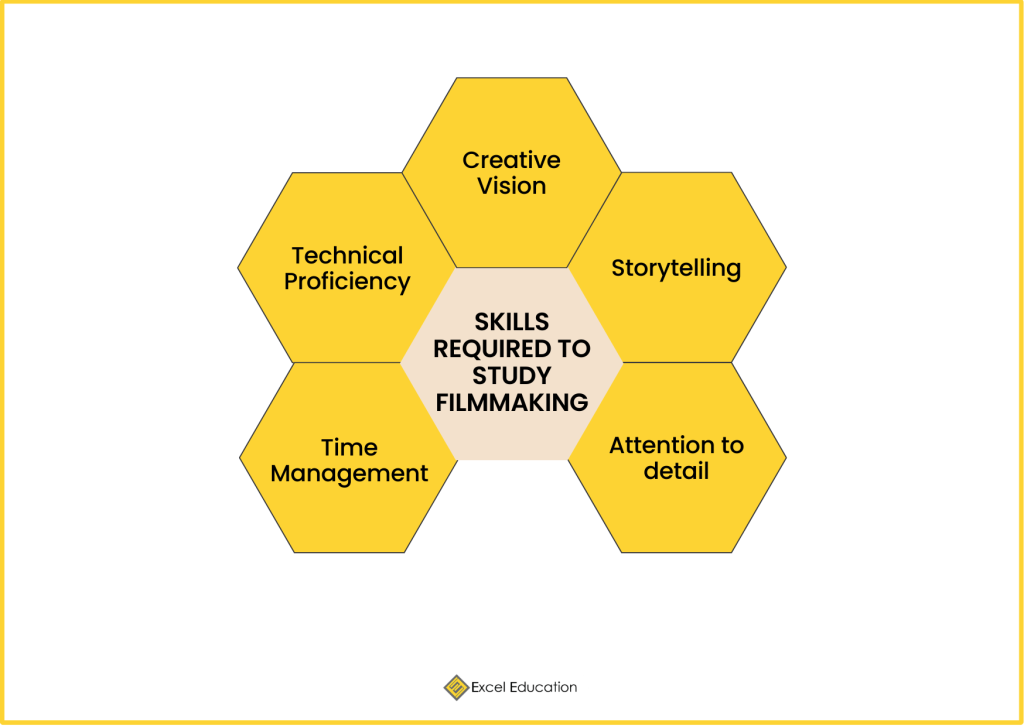
What is Filmmaking about?

The art of filmmaking usually brings together a mix of both creative and technical skills, along with storytelling collated in the manner of a consistent visual narrative. In essence, it involves making, preparing, recording, editing, and distribution of a film or movie. This process brings several creative heads together, such as the director, screenwriter, actors, cinematographer, editors, etc.
The affordable access to equipment that is now, through the technological revolution, influencing the process of filmmaking not only for many auteur filmmakers but also for offering resourceful people an opportunity to exercise their ideas in various approaches towards innovative techniques in the art of storytelling.
In this article, we have provided for you everything you need to know about studying Film University in the UK including the top UK universities that offer this degree.
Why study at Film University in the UK?

Hands-on Experience: The film schools offer students access to practical ‘hands-on’ experience with all the latest technologies and equipment used in today’s film industry. Students also get access to the use of cameras, editing software, and other equipment under more or less similar conditions to the real world.
Networking Opportunities: You will be immersed in colleagues, faculty, and professionals in the film program. Some of these networking opportunities are the most important contacts that a person will have made when starting work after college/university, for they provide invaluable information with regard to developing one’s career.
Portfolio Development: Throughout the course, students will have the possibility of working through a number of projects, some of them possibly of great consequence to the student and his or her work. This work can be used for the development of the personal and professional portfolio of the student.
Critical Thinking and Analysis: A film degree is more than learning how to make a film; it is trying to teach one how to understand them as well. With the skills that you acquire from your degree, you will be learning to critically analyse films, understand what is working, what is not, and why.
Storytelling: At the very heart of making films is storytelling. A course in this area will develop your ability to visually tell stories by means of combining narrative techniques, visual imagery, and sound with the purpose of entertaining and touching your audience.
Skills required to study Filmmaking

Creative Vision: Creative vision is very much needed in making films. It is the capability to conceive and visualise a story in its whole—from how it shall begin through how this will be carried out on the screen and heard in terms of audio to ensure a good and interesting film.
Technical Proficiency: Knowledge of the basic technical elements in filmmaking, such as camera operation, lighting, sound recording, and editing, will be very essential. This would ensure that the filmmaker has great effectiveness in the use of technology towards the actualization of their creative vision.
Storytelling: Filmmaking borders on the ability to tell a good story. It includes structuring a coherent and interesting storyline, developing characters, and building dramatic tension.
Time Management: Time is an important concept of the filmmaker, given that movie projects normally have very hard deadlines and a small amount of money to spend. Filmmakers have to plan and coordinate different areas of the production, so that the project will be completed within budget and time.
Attention to detail: Being focused on making your film guarantees that everything put in place will be well detailed and, in its own way, forming the vision and quality of the project from the script to the final cut.
Career opportunities with Film degree
After graduating with a Film degree in the UK, following are the few options you can consider to work as once finish study Film University in UK:
- Producer
- Sound engineer
- Video Editor
- Film director
- Media researcher
- Screenwriter
- VFX artist
- Production designer
- Music producer
- Floor manager
The average annual salary for a filmmaker is £33,844 in the UK. This can be different depending on where you plan to work.
General entry requirements to study Film University in the UK
Academic Entry
Academic Entry | Minimum Score |
A-Levels | BCC |
IB Diploma | 28 |
UEC | Overall mark 75% or B3 |
STPM | Minimum of 3 Principal Passes |
Matriculation | CGPA 2.00 |
Australian Matriculation (ATAR) | 70 |
Canadian Pre-University (CPU) | 60% |
Note: Universities may have different requirements. To learn more, get in touch with us!
English Language Entry Requirements
Entry Level | Minimum Score |
IELTS | 6.0 |
TOEFL | 79 |
Pearson Test of English (PTE) | 59 |
SPM 1119 | C |
Note: Universities may have different requirements. To learn more, get in touch with us!
Top Film University in the UK
1. University of Birmingham

University of Birmingham is a public university located at Birmingham, England and a founding member of Russell Group and research universities, Universitas 21. It is consistently ranked among the top universities that are highly renowned across the globe for its excellence in academics and research. The campus itself is characterised by an energetic and friendly atmosphere for educators, staff, and students from all over the world.
BA Film and Creative Writing inUniversity of Birmingham, ranked in the world’s top 75 for Arts and Humanities (QS World Subject Rankings 2023). The opportunity to learn from some of the world’s best cinema experts presents itself to a student through studying at this place. These include cinema producers, camera assistants, screenwriters, film editors, and finally, film writers/commentators. Students are set to get the best exposure in all genres of creative writing, film, and TV under the guidance of our industry expert, award-winning staff.
Programme Offered | BA Film and Creative Writing |
Duration | 3 or 4 years |
Intake | September |
Indicative Annual Fees (2024) | International Students: £22,860 |
Disclaimer: A 4-year study duration includes industrial/professional placement.
Contact us right now for a free consultation if you’d like more details about the costs, the format of the programme, and the entry requirements!
2. University of East Anglia (UEA)

The University of East Anglia (UEA) established in 1963 is a public research-intensive university located in Norwich, England. It is a member of Norwich Research Park, among the largest concentrations of researchers in Europe, and one that provides the service of many sites in agriculture, genomics, health, and environment.
UEA maintains a long and proud record of excellence in integrating the creative arts with critical thinking, traditions that this course builds upon in the areas of film and television. The teaching will educate the students in the writing, direction, and editing processes carried out offstage, while providing critical insights regarding the history and theory related to film and television. At the same time, students will cultivate the necessary skills for thriving in the film and television industry.
Programme Offered | BA (Hons) Film and Television Studies |
Duration | 3 or 4 years |
Intake | September |
Indicative Annual Fees (2024) | International Students: £20,600 |
Disclaimer: A 4-year study duration includes industrial/professional placement.
Contact us right now for a free consultation if you’d like more details about the costs, the format of the programme, and the entry requirements!
3. University of Central Lancashire (UCLan)

The University of Central Lancashire (UCLan) is a public university located in the city of Preston, Lancashire, England. It was chartered as The Institution for the Diffusion of Knowledge in 1828 and was further developed, diversified, and innovated to be a higher education institution offering programmes in many areas of study for both undergraduate and postgraduate levels. UCLan prides itself on being able to provide an all-inclusive and supportive learning environment.
Recognised by industry professionals, the degree programme provides a strong emphasis on practical and vocational development, preparing exceptionally professional students. Students will focus on professional and creative development across various formats, including narrative, documentary, independent short film, and feature film. The course offers scope for individuals to develop both personal creative expression and professional-level skills within a supportive and inclusive environment.
Programme Offered | BA (Hons) Filmmaking |
Duration | 3 years |
Intake | September |
Indicative Annual Fees (2024) | International Students: £16,500 |
Contact us right now for a free consultation if you’d like more details about the costs, the format of the programme, and the entry requirements!
For more information regarding the university, programme offered, entry requirements and fees, contact Excel Education.
About The Author

Brenda
Brenda enjoys action, thriller, psychological, and comedy movies as well as TV shows very much. Oftentimes, she really enjoy learning new stuff.

